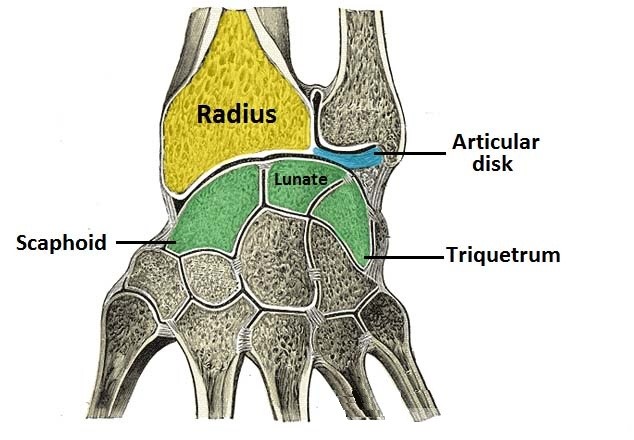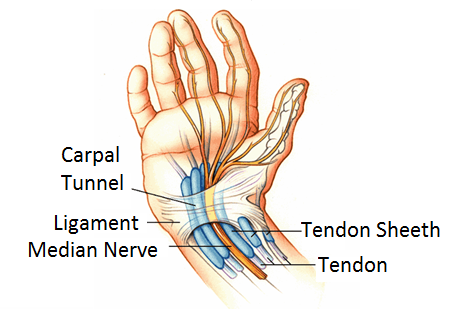
 Carpal tunnel syndrome is a condition that occurs when the median nerve is compressed as it
travels through the wrist. Carpal tunnel syndrome is usually caused by a combination of
factors, and certain individuals are at a higher risk of developing the condition. Women and
older people are more likely to develop carpal tunnel syndrome, and other risk factors
include heredity, repetitive hand use, hand and wrist position, pregnancy, and certain
health conditions such as diabetes, rheumatoid arthritis, and thyroid gland imbalance. Other
wrist pain causes can be carpal tunnel syndrome, wrist arthritis, injury to the wrist, gout,
or other reasons.
Carpal tunnel syndrome is a condition that occurs when the median nerve is compressed as it
travels through the wrist. Carpal tunnel syndrome is usually caused by a combination of
factors, and certain individuals are at a higher risk of developing the condition. Women and
older people are more likely to develop carpal tunnel syndrome, and other risk factors
include heredity, repetitive hand use, hand and wrist position, pregnancy, and certain
health conditions such as diabetes, rheumatoid arthritis, and thyroid gland imbalance. Other
wrist pain causes can be carpal tunnel syndrome, wrist arthritis, injury to the wrist, gout,
or other reasons.
Heredity may be an important factor because some people may have a smaller carpal tunnel or anatomic differences that change the amount of space for the nerve, and these traits can run in families. Repetitive hand use, especially when involving the same hand and wrist motions or activities over a prolonged period, can aggravate the tendons in the wrist and cause swelling that puts pressure on the nerve.
Extreme flexion or extension of the hand and wrist for a prolonged period during activities can also increase pressure on the nerve, and hormonal changes during pregnancy can cause swelling that results in pressure on the nerve.
The symptoms of carpal tunnel syndrome can include numbness, tingling, burning, and pain in the thumb and index, middle, and ring fingers. These symptoms often wake people up at night and may also occur during the day when holding something for a prolonged period with the wrist bent forward or backward. It may also cause wrist pain when lifting.
Occasional shock-like sensations that radiate to the thumb and index, middle, and ring fingers may also occur, and pain or tingling may travel up the forearm toward the shoulder. Weakness and clumsiness in the hand may make it difficult to perform fine movements such as buttoning clothes, and dropping things due to weakness, numbness, or a loss of proprioception (awareness of where the hand is in space) may also occur.
In most cases, the symptoms of carpal tunnel syndrome begin gradually without a specific injury, and many patients find that their symptoms come and go at first. However, as the condition worsens, symptoms may occur more frequently or persist for longer periods. Moving or shaking the hands may help relieve symptoms in some patients.
Diagnosis can be established by one or more of the following tests. Nerve conduction studies (NCS), Electromyogram (EMG), X-Ray, Ultrasound, MRI
If you are experiencing any of these symptoms or suspect you have carpal tunnel syndrome, you should consult us for an evaluation and appropriate treatment. Early diagnosis and treatment can help prevent permanent damage to the median nerve.
Carpal tunnel syndrome treatment at home:
Take a break from repetitive work like typing, guitar, or similar activities. Avoid extreme flexion or extension of the wrist as nerve compression treatment. Splinting carpal tunnel syndrome may relieve pressure on the median nerve. You can do wrist pain treatment exercises while you are standing in line at the grocery store or sitting at your desk at work. For example, make a fist and then slide your fingers until they are straight again. Repeat this action five to 10 times. This can help relieve any pressure on your wrist.
 Non-surgical treatments may also include wearing a brace or carpal tunnel splinting at night to keep your wrist in a neutral position. Carpal tunnel syndrome medicine like anti-inflammatory medications may give temporary relief. You need modifying activities that aggravate your symptoms. Carpal tunnel syndrome treatment exercises for nerve gliding are recommended by physiotherapists.
Non-surgical treatments may also include wearing a brace or carpal tunnel splinting at night to keep your wrist in a neutral position. Carpal tunnel syndrome medicine like anti-inflammatory medications may give temporary relief. You need modifying activities that aggravate your symptoms. Carpal tunnel syndrome treatment exercises for nerve gliding are recommended by physiotherapists.
In some cases, medicines of wrist pain treatment relief like steroid injection into the carpal tunnel to relieve symptoms or to help diagnose the condition are recommended. However, the positive effects of the injection may only be temporary in patients with moderate to severe disease. Early diagnosis is essential if you want carpal tunnel syndrome treatment without surgery. Acupuncture treatment for carpal tunnel syndrome provide substantial relief.
Carpal tunnel syndrome treatment physiotherapy includes heat modalities, cold therapy, pulsed ultrasound, and shockwave therapy showed better outcomes in relieving pain. Wearing a resting splint can help prevent the symptoms from occurring at night. A working splint can be useful if the symptoms are aggravated by particular activities. Carpal tunnel syndrome physiotherapy treatment by massage, tapping techniques, and transverse friction massage have the best effects in the short and long term.
Carpal tunnel syndrome cure: Fortunately, early carpal tunnel symptoms can often be relieved with simple measures such as wearing a wrist splint while sleeping, performing exercises to keep the nerve mobile, avoiding certain activities that aggravate the symptoms, and receiving a steroid injection into the carpal tunnel. However, if pressure on the median nerve continues, it can lead to nerve damage and worsening symptoms. In such cases, surgery to relieve the pressure on the median nerve may be recommended.
If you have a severe case, surgery can help, but your symptoms may not go away completely.
If non-surgical treatment does not provide relief or the condition has worsened, carpal tunnel syndrome surgery may recommend. The decision to recommend surgery is based on the severity of your symptoms, physical exam findings, response to non-operative treatment, and results of testing. Surgery may also be recommended in cases where there is constant numbness and wasting of thumb muscles or if significant nerve changes are detected on testing.
De Quervain tenosynovitis is a painful condition affecting the tendons on the thumb side of the wrist. If you have de Quervain tenosynovitis, you will probably feel pain when you turn your wrist, grasp anything or make a fist. Getting a steroid injection to reduce inflammation and relieve the pressure in the tendon sheath. De Quervain syndrome treatment involves immobilizing the wrist by wearing a splint or brace to rest your thumb and wrist. You may need to take a nonsteroidal anti-inflammatory drug (NSAID) such as ibuprofen.
Acupuncture has been proven to be a successful treatment option for individuals who suffer from carpal tunnel syndrome. Various unbiased studies have demonstrated that acupuncture surpasses standard care, which includes anti-inflammatory drugs, in terms of effectiveness. With acupuncture, patients experience relief from pain, inflammation, numbness, and also regain their motor function.
We at Dr. Pardeshi Acupuncture routinely treat carpal tunnel syndrome with good results. In you have any question regarding CTS you can ring 9823033415.